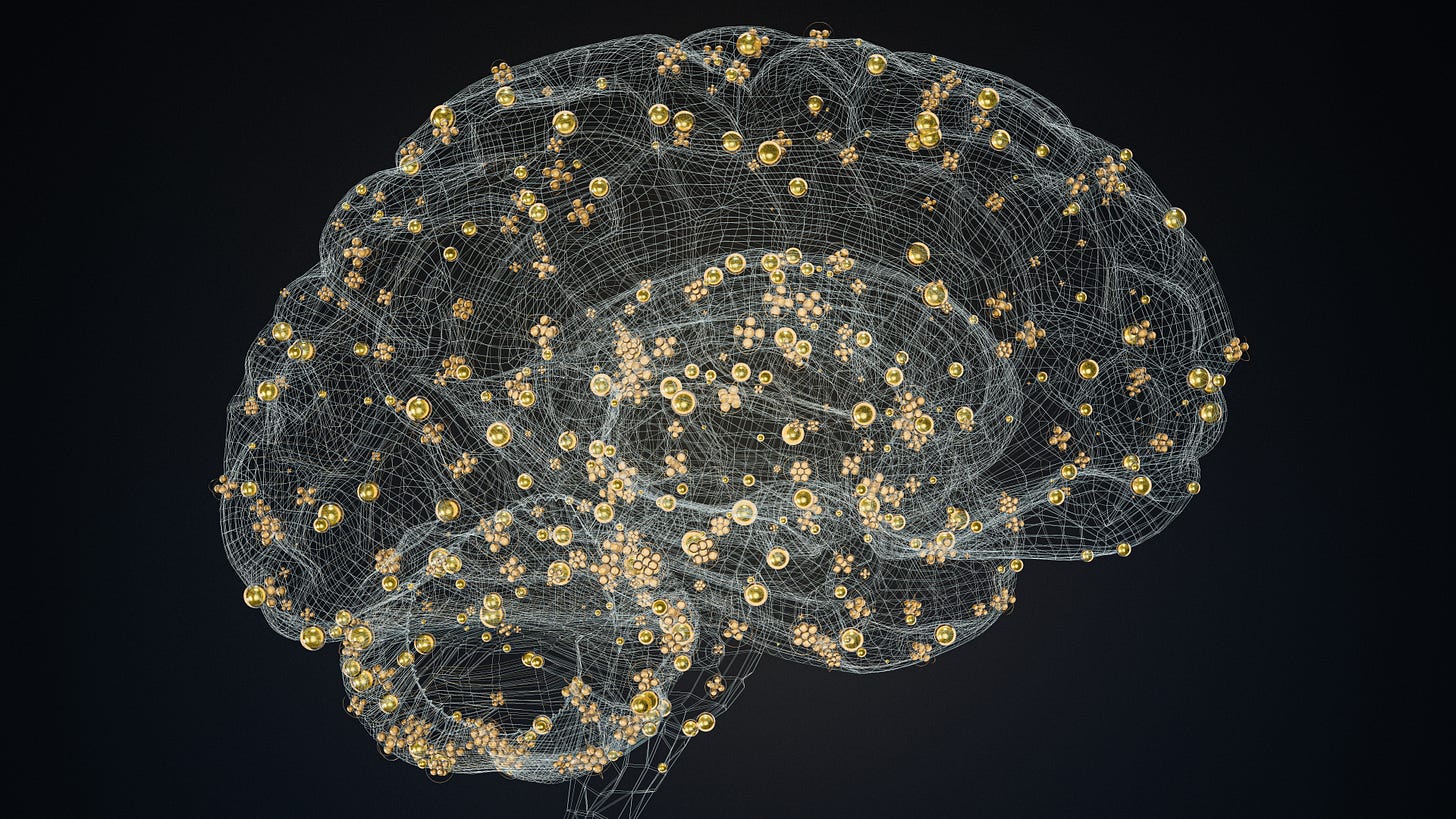I’m Nahid, “the nervous system whisperer” an Author and somatic movement educator. I’ve been teaching for twenty years and specialise in helping clients through burnout, anxiety, stress and trauma-related issues with The Soothe Programme.
Buy Soothe UK out now in paperback / Soothe US
Hello – hope your week went well. I'm thinking about grief a lot lately, not only because I’ve been bearing witness to such devastation on our screens but also I’m getting older, people I know are getting ill, older friends are dying, friends' parents are dying. I have been to more funerals over three years than ever before and yet... we don't know how to process loss.
My friend who lives next door, lost her husband of 54 years last year.
I wanted to offer her compassionate companionship, and we started a weekly ritual of a long dog walk soon after his funeral. We talk about the world, our lives, art, books, culture and sometimes…how grief unfolds.
I have been intimately tied with my husband for 26 years. I have no children. I cannot imagine my life without him. That level of loss makes me take a sharp breath.
I lean into my teaching and remind myself that how I respond is a choice. I could fall apart, and in this moment, just thinking about it makes me feel that I would. I can also imagine how to feel the grief without falling apart, and continue to be engaged in my life.
Living and dying are part of the human condition. I don’t think you can fully live if you don’t also make peace with knowing that one day people you love will die and you will die. It’s the basis of most Eastern philosophies. For me, it is more helpful to be curious about grief and death rather than shy away from it. I’m going there in this week’s newsletter and sharing six science-backed strategies . For paid subscribers, I have uploaded a delicious somatic lesson to soothe in challenging times.
Grief is a universal human experience, yet its complexity and deeply personal nature often make it difficult to understand and navigate. Beyond the emotional turmoil, grief triggers significant changes in our brain and body.
When we experience loss, our brains undergo remarkable changes that affect our thoughts, emotions, and even physical sensations. Understanding these neurobiological processes can help validate our experiences and guide us toward healing.
Research reveals that acute grief activates the body's stress response system. The amygdala, our brain's emotional processing centre becomes hyperactive, triggering the release of stress hormones like cortisol. This explains the physical symptoms many grieving people experience: fatigue, sleep disturbances, reduced appetite, and compromised immune function.
Another study found that when bereaved people viewed photos of their deceased loved ones, they showed increased activity in the part of the brain region associated with reward processing. This neurological response helps explain why grief can include both intense pain and a yearning to reconnect with the lost person.
Grief disrupts the brain's default mode network (DMN), which governs our sense of self in relation to others. Research demonstrated that this disruption contributes to the feeling that part of oneself has been lost along with the loved one.
A comprehensive review in The New England Journal of Medicine highlighted how grief affects our cognitive functions. The prefrontal cortex, responsible for decision-making, planning, and regulating emotions, shows reduced activity during grief, explaining why those grieving often report difficulty concentrating and making decisions.
Perhaps most importantly, neuroimaging studies reveal that our brains have a remarkable capacity to adapt following loss. Over time, neural pathways reorganise, creating new patterns of connection and meaning that incorporate the reality of the loss while allowing continued functioning and eventual healing.
Join our Monthly Sunday Somatic Soothe session at 5 PM on Sunday March 16th. Book your spot now or sign up as a paid subscriber to include this as part of your membership benefits.
Six Science-Backed Strategies for Navigating Grief
Based on current research, here are six evidence-based approaches to help navigate the grief journey, along with the scientific rationale for each:
1. Practice Mindfulness Meditation
The Science: A study published in Psychological Medicine found that mindfulness-based interventions significantly reduced symptoms of complicated grief. Mindfulness practices help regulate activity in the anterior cingulate cortex and prefrontal regions, improving emotional regulation.
How It Helps: Regular mindfulness practice (even just 10 minutes daily) helps create distance between emotional experience and automatic reactions. By observing grief emotions without judgment, you strengthen neural pathways associated with resilience and reduce rumination.
2. Maintain Physical Activity
The Science: Research demonstrated that moderate exercise increases production of brain-derived neurotrophic factor (BDNF), a protein that supports brain health and neuroplasticity. Exercise also releases endorphins that temporarily relieve emotional pain.
How It Helps: Even gentle movement like walking for 20-30 minutes daily can reduce cortisol levels, improve sleep quality, and boost mood-regulating neurotransmitters like serotonin and dopamine that are often depleted during grief.
3. Engage in Expressive Writing
The Science: Multiple studies, including Pennebaker's foundational research (2018), show that expressive writing about grief experiences activates the brain's reward and emotional processing centres while reducing activity in areas associated with negative emotion.
How It Helps: Writing about your feelings, memories, and experiences for 15-20 minutes several times a week helps organise chaotic thoughts and integrate difficult experiences into your life narrative, promoting cognitive restructuring and meaning-making.
4. Seek Social Connection
The Science: A ground breaking study in 2013 found that social rejection activates the same brain regions as physical pain. Conversely, positive social connection releases oxytocin, which reduces amygdala activity and stress hormone production.
How It Helps: Sharing your grief with supportive others activates the brain's social safety circuitry, reducing isolation and providing external regulation for overwhelmed emotional systems. Even when you don't feel like it, brief social interactions can provide neurobiological benefits.
5. Establish Sleep Routines
The Science: research demonstrates that sleep disruption interferes with emotional processing and memory consolidation, two processes essential for grief integration. During sleep, the brain processes emotional experiences and forms new neural connections.
How It Helps: Prioritising sleep hygiene (consistent bedtime, screen limitations, comfortable environment) supports the glymphatic system, which clears stress-related metabolic waste from the brain during sleep, improving cognitive function and emotional stability.
6. Practice Ritual and Meaning-Making
The Science: Research shows that rituals and meaning-focused activities activate brain regions associated with autobiography, self-reference, and existential thinking, helping integrate loss into one's continued life story.
How It Helps: Creating rituals, memorials, or meaningful projects related to your loss helps bridge the gap between past and present. These activities engage multiple brain regions, including those responsible for narrative construction and meaning, supporting the creation of a coherent self-identity that incorporates the loss.
Moving Forward
Grief is not a linear process with clear stages but rather a complex neurobiological response that evolves over time. There are multiple resilient pathways through grief, and most people naturally find their way toward healing.
By understanding the brain science behind grief and implementing these evidence-based strategies, you can support your brain's natural healing processes.
Remember that grief's intensity doesn't measure your love, it reflects the profound neural networks that connection creates in our brains.
While grief changes your brain, it also reveals the remarkable resilience and adaptability of your neural architecture. With time and supportive practices, your brain will forge new pathways that honour what you've lost while creating space for continued growth and connection.
Join me on Retreat
The next Soothe Day Retreat in London is on Saturday 17th May - I teach the principles of soothing your system each time but also offer fresh perspectives for brain and body movement based on research, what clients are going through, and what is happening in the world. Book into the day retreats throughout the year to keep reminding your system how it feels to be at ease. Nab your spot here.
The Soothe Weekend Retreat on 10th - 12th October at The Quaives, a lovely retreat space in Kent, 51 minutes from St Pancras. I’ve already sold the cottages and the rooms in the main house, here is what I have left. Don’t miss it!
On-site: Dorm: 3 beds in the scandi-style dorm @ £650 pp
3 minutes drive staying at The Tor Spa
4 x ensuite rooms 5 minutes car drive away @ £1150 pp
I’m only taking 12 people, be there!
Lefkada, Greece 2026 - register your interest by sending me reply with Greece 2026.
If my work has helped you in some small way, please can you share and restack my newsletter? It helps people to find my work. Thank you.
Stay human,
Nahid x
A somatic lesson to soothe your soul. You will be lying on the floor, on your back with knees bent.
Keep reading with a 7-day free trial
Subscribe to Soothe with Nahid de Belgeonne to keep reading this post and get 7 days of free access to the full post archives.











